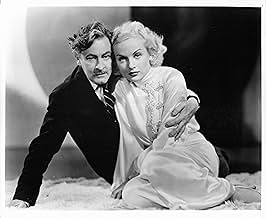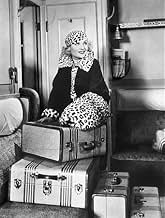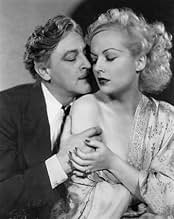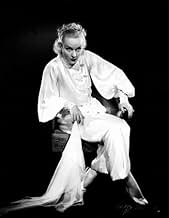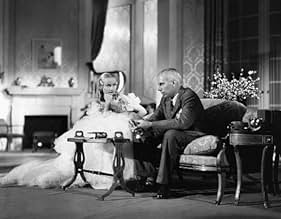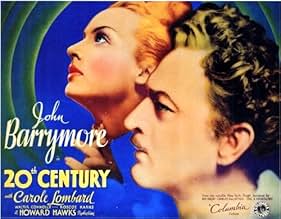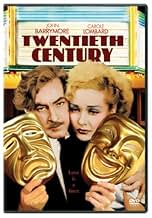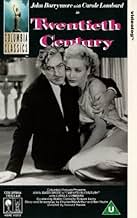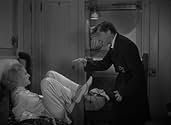VALUTAZIONE IMDb
7,2/10
7620
LA TUA VALUTAZIONE
Aggiungi una trama nella tua linguaA flamboyant Broadway impresario who has fallen on hard times tries to get his former lover, now a Hollywood diva, to return and resurrect his failing career.A flamboyant Broadway impresario who has fallen on hard times tries to get his former lover, now a Hollywood diva, to return and resurrect his failing career.A flamboyant Broadway impresario who has fallen on hard times tries to get his former lover, now a Hollywood diva, to return and resurrect his failing career.
- Regia
- Sceneggiatura
- Star
- Premi
- 4 vittorie e 1 candidatura in totale
Charles Lane
- Max Jacobs
- (as Charles Levison)
Bobby Barber
- Sign Painter
- (non citato nei titoli originali)
Herman Bing
- Beard #1
- (non citato nei titoli originali)
Lynton Brent
- Train Secretary
- (non citato nei titoli originali)
Anita Brown
- Black Stage Showgirl
- (non citato nei titoli originali)
James Burke
- Sheriff
- (non citato nei titoli originali)
James P. Burtis
- Train Conductor
- (non citato nei titoli originali)
Eddy Chandler
- Cameraman
- (non citato nei titoli originali)
Nick Copeland
- Treasurer
- (non citato nei titoli originali)
Recensioni in evidenza
Howard Hawks' early foray into screwball comedy pits the wonderful pairing of John Barrymore and Carole Lombard against each other. She is Lily Garland, a Broadway actress about to break in Hollywood; he's her theatrical producer and on-off beau, desperate for her to stay. Around half of the film is taken up with them screeching at each other, leaving the supporting actors with very little to do.
There is a lot of sparkle here, great performances from the two leads, who work together just fine, and a screenplay which moves almost as fast as the train which gives the movie its title. Ten years after this was made, both Barrymore and Lombard were dead, but this stands as a fine epitaph for them together.
There is a lot of sparkle here, great performances from the two leads, who work together just fine, and a screenplay which moves almost as fast as the train which gives the movie its title. Ten years after this was made, both Barrymore and Lombard were dead, but this stands as a fine epitaph for them together.
If "The Lady With Red Hair" (about Mrs. Leslie Carter) gave us a good portrait of theatrical producer/director David Belasco (in the capable hands of Claude Rains), this film shows the ham side. Oscar Jaffe (John Barrymore) is based on Belasco, with his less attractive sides. Here is not the man who simply helped create proper modern stage production and rehearsal technique, but the egotistical side of him (the side Rains showed when he released all contacts to Leslie Carter -Miriam Hopkins in that film - when she dared to marry without his consent). Here Jaffe has created the actress sensation "Lily Garland" from an ambitious shop girl named Mildred Plotka (Carole Lombard). Jaffe has played a caring, fatherly Svengali to her, prodding her by caring, sweet, regretful terms to do what he wants (except they are rehearsing). But although - eventually - Lily is willing to become his lover, he is so jealous that he drives her to flee from him. He decides he can do it again, but falls on his face. She goes on to screen immortality in Hollywood. So he is forced to pull out all stops to get her back to a signed contract, when he learns she and he are traveling back to New York on the Twentieth Century train.
Howard Hawks would tackle farce several times in his career: "His Gal Friday", "I Was A Male War Bride", "Man's Favorite Sport" were all in the future. But this may have been the best of them. The other films have great choice moments, but this one is almost flawless from the start. Take the beginning when Jaffe brings the cast of his first play starring Lili. It is a piece of sentimental pap that Jaffe always produces (later on, before being dismissed by him, Charles Lane tells off Jaffe the truth that he produces hackwork and "gets away with it" because of Lili's talent). In fact, it is a spoof of a popular piece of melodrama from the late 1920s, "Coquette", which was turned into a film in 1929 (and netted Mary Pickford an Oscar, which she should have gotten for other films, such as "Sparrows"). The cast, including an African-American in a typical stereotype servant role of the period, have to go through several hours of rehearsing the first scene due to Mildred/Lily's failure to match Jaffe's exacting direction. What the overly controlling Jaffe does with stage blocking and a piece of chalk is a nightmare for anyone who has ever tried to produce or act in a play. He does, however, know about acting - he reminds Mildred/Lily that when she calls for "Daddy" in an old southern plantation house she is not to use a voice similar to calling "Taxi" in the street.
I won't go into the rest of the film, but wait for "the iron door" whose hinges get dingier and more rusted with each closing, or Barrymore's commentary on "the Passion Play". Lombard has a more subtle, reacting part, but she is Barrymore's equal partner, having the moment of reality at the center of the film: on the train, when after screaming at each other she breaks down and cries, and makes Jaffe realize that they have built themselves into an unhealthy universe where they can't be real people anymore. It's a brief, and touching moment - fortunately not destroying the sheer lovely nuttiness of the rest of the film.
Howard Hawks would tackle farce several times in his career: "His Gal Friday", "I Was A Male War Bride", "Man's Favorite Sport" were all in the future. But this may have been the best of them. The other films have great choice moments, but this one is almost flawless from the start. Take the beginning when Jaffe brings the cast of his first play starring Lili. It is a piece of sentimental pap that Jaffe always produces (later on, before being dismissed by him, Charles Lane tells off Jaffe the truth that he produces hackwork and "gets away with it" because of Lili's talent). In fact, it is a spoof of a popular piece of melodrama from the late 1920s, "Coquette", which was turned into a film in 1929 (and netted Mary Pickford an Oscar, which she should have gotten for other films, such as "Sparrows"). The cast, including an African-American in a typical stereotype servant role of the period, have to go through several hours of rehearsing the first scene due to Mildred/Lily's failure to match Jaffe's exacting direction. What the overly controlling Jaffe does with stage blocking and a piece of chalk is a nightmare for anyone who has ever tried to produce or act in a play. He does, however, know about acting - he reminds Mildred/Lily that when she calls for "Daddy" in an old southern plantation house she is not to use a voice similar to calling "Taxi" in the street.
I won't go into the rest of the film, but wait for "the iron door" whose hinges get dingier and more rusted with each closing, or Barrymore's commentary on "the Passion Play". Lombard has a more subtle, reacting part, but she is Barrymore's equal partner, having the moment of reality at the center of the film: on the train, when after screaming at each other she breaks down and cries, and makes Jaffe realize that they have built themselves into an unhealthy universe where they can't be real people anymore. It's a brief, and touching moment - fortunately not destroying the sheer lovely nuttiness of the rest of the film.
John Barrymore is in rare form in Twentieth Century (1934), Howard Hawks's hilarious, fast-paced screwball comedy. He plays flamboyant Broadway director-producer Oscar Jaffe, a man for whom the whole world is truly a stage. The always enchanting Carole Lombard co-stars as Mildred Plotka/Lily Garland. (Oscar demanded the name change because Mildred Plotka isn't nearly as glamorous sounding as Lily Garland.) Mildred, an aspiring Broadway actress, is remade by Oscar into a star of the New York stage. For three years he directs her plays, guides her career, and is her lover. But after they have a big disagreement, she takes off for Hollywood. Her career soars; his plummets. Time passes and then on board the Twentieth Century heading for Grand Central Station, they meet again. As usual in a Hawks film, the supporting cast is outstanding; and Ben Hecht and Charles MacArthur's screenplay is one of their finest.
Why this loud talky mess gets top ratings from professionals stumps me (TMC, Maltin, et al.). The only thing I can figure is they're overly impressed by pedigree—namely Hawks, Lombard, Barrymore, and the writing team of Hecht and MacArthur. But once you get past the legendary reputations, the results are more annoying than impressive. It seems someone confused frenetic with amusing, while the arm waving babble is simply non-stop. It's like everyone will laugh if you just say it loud enough with enough spastic energy.
Barrymore, in particular acts like he's heck-bent on climbing the walls. But the lines aren't funny, and neither are the situations—reputations or no. Maybe the screenplay is aimed at show-biz types who will catch on to esoteric inside jokes. Some such is the only explanation I can think of. Hawks, fortunately, appears to have learned his lesson. His Binging Up Baby (1938) amounts to a masterpiece of madcap. It's everything this indulgent mess isn't, but should be. There appears to be a moral to this movie, but whatever it is, it's not a good one.
Barrymore, in particular acts like he's heck-bent on climbing the walls. But the lines aren't funny, and neither are the situations—reputations or no. Maybe the screenplay is aimed at show-biz types who will catch on to esoteric inside jokes. Some such is the only explanation I can think of. Hawks, fortunately, appears to have learned his lesson. His Binging Up Baby (1938) amounts to a masterpiece of madcap. It's everything this indulgent mess isn't, but should be. There appears to be a moral to this movie, but whatever it is, it's not a good one.
Funny and intelligent comedy features a brilliant performance by Barrymore, spoofing his earlier "Svengali" role. He looks and acts a lot like Peter Sellars would in later similar performances; now morose, then practically jumping with energy. Lombard also turns in a right-on performance.
Here is a film where Hawks really finds his mark, because the comedic action is perfectly timed, flows nicely, and feels natural, and even includes some early Hawks "overlapping dialogue".
Hardly a dull moment, miles above its peers.
Here is a film where Hawks really finds his mark, because the comedic action is perfectly timed, flows nicely, and feels natural, and even includes some early Hawks "overlapping dialogue".
Hardly a dull moment, miles above its peers.
Lo sapevi?
- QuizJohn Barrymore once said that the role of Oscar was "a role that comes once in a lifetime" and even deemed this his favorite of all the movies he appeared in.
- Blooper(at around 20 mins) O'Malley arrives at Lily's apartment. When she answers the door, he discards his newspaper twice between shots.
- Citazioni
Oscar Jaffe: Go on, Owen... tell her I'm dying... and DON'T OVERACT!
- Versioni alternativeThere is an Italian edition of this film on DVD, distributed by DNA Srl. The film has been re-edited with the contribution of film historian Riccardo Cusin. This version is also available for streaming on some platforms.
- ConnessioniFeatured in The Men Who Made the Movies: Howard Hawks (1973)
- Colonne sonoreHappy Days Are Here Again
(1929) (uncredited)
Music by Milton Ager
Lyrics by Jack Yellen
Sung a cappella by Walter Connolly
I più visti
Accedi per valutare e creare un elenco di titoli salvati per ottenere consigli personalizzati
- How long is Twentieth Century?Powered by Alexa
Dettagli
Botteghino
- Lordo in tutto il mondo
- 10.078 USD
- Tempo di esecuzione
- 1h 31min(91 min)
- Colore
- Proporzioni
- 1.37 : 1
Contribuisci a questa pagina
Suggerisci una modifica o aggiungi i contenuti mancanti


